Today in Tedium: After Lemmy Kilmister of Motörhead died last month, tributes to the rocker were pretty easy to find—what couldn't you say about this guy, who clearly played a massive role in the history of heavy metal? Perhaps the most curious and interesting tribute came from the world of retro gaming, where fans of Lemmy (a noted gamer) worked diligently to make an Amiga game based on Motörhead available to modern users. "You play as Motorhead's leadman Lemmy Kilmister, kicking ass through multiple side scrolling levels, using both guitar and fists to punch your way to the top," Indie Retro News explains. This got us to thinking—what other retro games are out there, quietly doing honor to rock gods of yore? Today's Tedium hopes to pull out more than the Ace of Spades. — Ernie @ Tedium
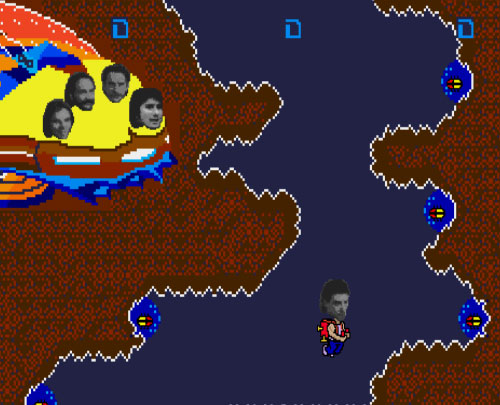
Stop Believin'
When Journey was at the height of its fame, someone convinced the corporate rock band to promote itself using a arcade game ahead of its 1983 tour. The result was a mish-mash of confusing game concepts, poor controls, and digimatized versions of the band's faces—and makes one long for the days when the worst game you'd ever played was the Atari 2600 version of E.T. The Internet Archive has an in-browser playable version of it over this way. (One fun fact about the game: those digimatized faces in the game were created with a digital camera that was to be included with the physical arcade game. Problem was, people kept taking R-rated photos with the cameras, so they ditched the idea.)
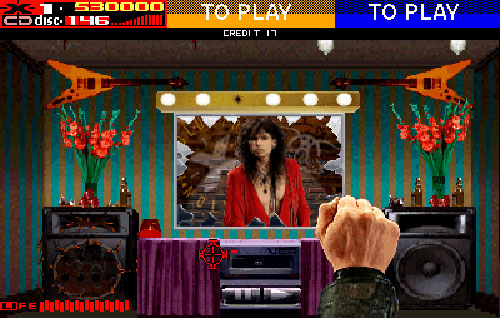
Get a Grip
A slightly better arcade game built around a rock band came around about a decade later, when Aerosmith became the featured band in Revolution X, a shoot-em-up style game that featured a number of Aerosmith songs as well as a bizarre plot line involving the rescue of the band from a paramilitary organization called the "New Order Nation." You don't just shoot bullets; you shoot explosive CDs. And you rescue members of Aerosmith along the way. It was a popular quarter-muncher at the time, but the game's concept didn't translate quite so well to consoles. As a result, it got some pretty rough reviews—with many criticizing the lower graphics quality and the sound compared to the arcade version. "The graphics are bad, even for 16-bit standards," IGN wrote of the Playstation version. "Even when Aerosmith aren't playing the music is awful." To get a full taste of Aerosmith on your console, here's the Genesis version of the game.
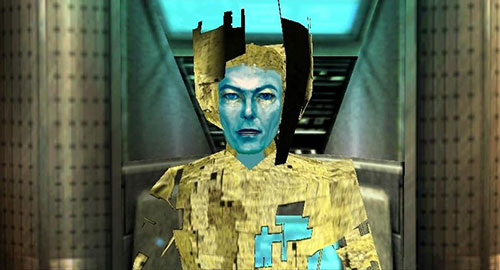
I Wish You Could Swim
Late rocker David Bowie made a lot of art that was popular. But occasionally, he made art that was misunderstood by the broader world (just ask Trent Reznor, who once toured with the guy). One of those pieces of art was the game Omikron: The Nomad Soul, a 1999 Sega Dreamcast game that was a failure as a game, but as a work of art—one that Bowie himself assisted with—people are still trying to embrace it. A 2014 Paste Magazine piece highlights the strange relationship some have with the game, with author Joe Bernardi explaining that he was once stuck with little to do during a summer vacation besides play the game. "For whatever input Bowie had in the game, however, he was unable to contribute his trademark monomania. Instead of doing one thing really well and changing that thing extremely frequently, Omikron just does a lot of different things poorly." If you want to play this game, it's on Steam.
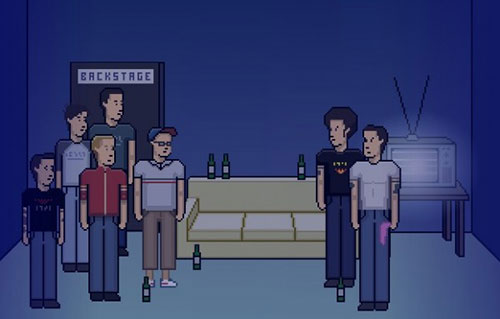
Fevers and Mirrors
At the turn of the 21st century, emo music was suffering a bit of an identity problem. A kind of music borne from a fusion of hardcore music and introspective emotions, the genre shifted and broadened to the point where "emo" essentially stood for "feelings with guitars." In one of the best reactions to the rise of the genre, budding Flash developer Jason Oda created The Emo Game, which featured all the major emo musicians of the era—among them Conor Oberst of Bright Eyes, Cedric Bixler-Zavala of At the Drive-In, and Chris Carraba of Dashboard Confessional (who is played, hilariously, as heart-on-sleeve comic relief)—attempting to save The Get-Up Kids from being attacked by Steven Tyler. It's a jokey game concept, but a clever one, and it turned out to be a starting point for Oda, who has since made numerous games for bands, most famously Skrillex Quest.
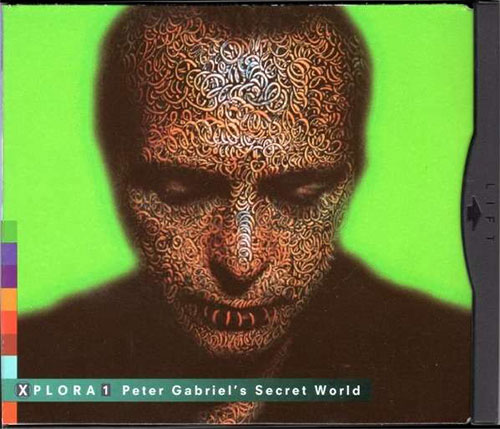
Digging in the Dirt
It's hard to remember these days, but there was once a period when we treated "multimedia," particularly that driven by full-motion video and CD-ROMs, as this hallowed concept that was going to change the way we interacted with games. In the end, it just turned out that CDs were simply a vessel for the games rather than a game-changing element. The only truly good example of an interactive multimedia adventure title was Myst, a point-and-click game that created numerous imitators. One of those imitators came from Peter Gabriel, whose Xplora 1, Peter Gabriel's Secret World borrowed heavily from the concept to create an in-depth way to research Gabriel's then-recent album Us. "This effort seems to be about the best one can do with the present state of multimedia," a Washington Post review backhandedly stated about the game. (You can sample the gameplay in this YouTube clip.)
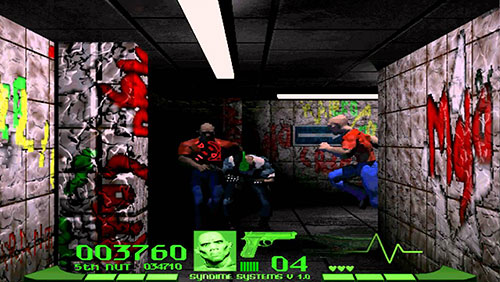
Be Quick or Be Dead
The heavy metal band Iron Maiden has long had a quiet obsession with video games, and seeing an opportunity to show its fans that it could create a game they could actually enjoy, the band threw a first-person shooter in the package with its 1999 greatest-hits CD Ed Hunter. Unfortunately, the game—despite having a clever concept (the levels were based on the band's quite-awesome album covers)—failed to connect with its audience, because the game itself was in fact not awesome. "You ARE right, that does sound awesome, but in practice as opposed to theory, the game just fumbles this baby all the way across the field," RetroJunk's James Swift wrote of the game. "The enemies are repetitive, the controls are stiffer than a piece of plywood, and there is NOTHING even remotely resembling strategy going into the title." On the plus side, Iron Maiden has never really stopped trying to bring its iconic mascot Eddie the Head back into the world of gaming. They've had much better luck lately.
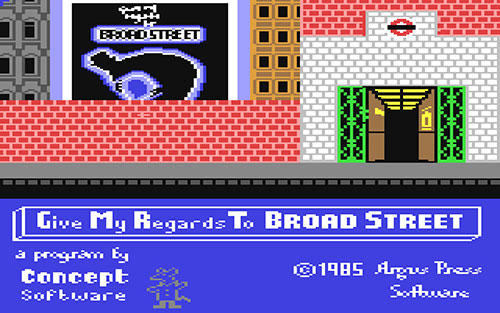
Get Back to Where You Once Belonged
Yes, yes, we know you know about the other video game featuring Paul McCartney. But did you know about the game Macca did for the Commodore 64? Yes, Macca did a game for the Commodore 64 and ZX Spectrum, and it was based on his long-forgotten 1984 movie Give My Regards to Broad Street. The plot to the game is very Macca-esque: the master tapes to his new album have been lost, and while most of the album has been recovered, the first single hasn't been, so you're trying to get your band back together. (Side note: How many plots to games and movies are now null-and-void thanks to the cell phone?) The game is worth checking out for the chintzy 8-bit take on "Band on the Run," which plays repeatedly. (Should've gone with "Uncle Albert/Admiral Halsey" if you ask me.) The ZX Spectrum version of the game is playable in your browser, by the way.
The crazy thing about all these games is that they were actually released and hit the market in a real way. Can you imagine some of the games that weren't?
Well, you don't have to imagine, because I can tell you about a couple of the failed projects: In 1989, the New Kids on the Block announced that they were making an NES game, which was never released. In 2009, however, a prototype box for the game surfaced on eBay. (No word on actual cartridges.)
And though it has never surfaced, Vanilla Ice was rumored to have been involved with an NES game called Rap Quest.
One music-related game that didn't get released but has been found in complete form is one based on the California Raisins franchise. It was made by Capcom, so it was actually good.
Before the world of gaming compartmentalized music games into something that required a fake guitar and the ability to tap buttons like a human metronome, this is the weirdness gamers had to look forward to.




